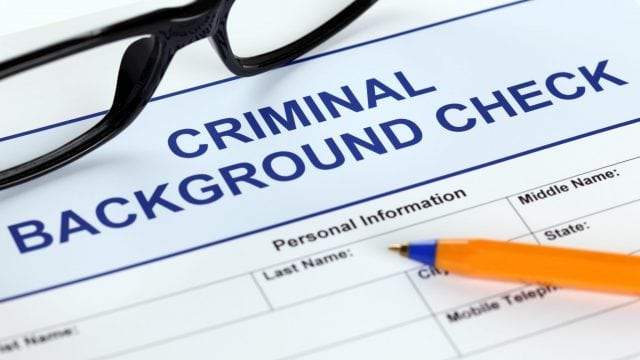 This guide lists the top 10 reasons expungements are objected to in NJ. Whether you filed your expungement on your own or your attorney advised you that the prosecutor objected to your expungement, you might be wondering exactly what that means. There are various reasons why the county prosecutor assigned to handle your expungement might object to it.
This guide lists the top 10 reasons expungements are objected to in NJ. Whether you filed your expungement on your own or your attorney advised you that the prosecutor objected to your expungement, you might be wondering exactly what that means. There are various reasons why the county prosecutor assigned to handle your expungement might object to it.
Below are some 10 of the most frequently encountered scenarios.
1. You failed to disclose your entire criminal record.
Perhaps the most common reason why New Jersey expungement prosecutors object to expungement petitions is due to the petitioner’s failure to disclose their entire criminal record. A failure to disclose your entire criminal history on your expungement petition will most certainly result in the state objecting to your expungement.
The prosecutor assigned to handle your expungement will conduct an exhaustive investigation into your criminal history. Thus, even minor offenses such as municipal ordinance violations (i.e., noise complaints) or offenses that resulted in a dismissal of all charges or that were expunged must be disclosed. You must also make sure to disclose out-of-state offenses and any out-of-state traffic offenses which are considered criminal in nature (some states, for example, consider DUIs to be criminal in a nature). Thus, before you apply for an expungement in New Jersey, you should always obtain a complete copy of your criminal record if you are unsure of exactly what it consists of.
If your expungement was objected to on this basis, your expungement lawyer will need to amend your expungement petition to include the missing information. You should note, however, that the undisclosed arrest may affect your overall expungement eligibility. Thus, before proceeding with your expungement you should first check with your New Jersey expungement lawyer to make sure that you are still eligible.
2. You provided either incomplete or inaccurate information.
Another fairly common basis for an objection would be that the expungement petition contains either inaccurate or incomplete information. Perhaps you failed to include the arrest date for one of your offenses or perhaps the court records you relied on contained the wrong statute number. Whatever the case may be, your expungement petition must be amended so that it contains only accurate and complete information. Again, however, you should first check with your New Jersey expungement lawyer to ensure that you are still eligible to proceed with your expungement if your expungement was objected to on this basis.
3. You have too many convictions and/or offenses on your record.
In order to be eligible for expungement, a number of requirements must be met. One of these requirements is that you must not have too many prior convictions on your record. For example, if you have more than three disorderly persons (i.e., misdemeanor) convictions on your record, you might not be eligible to expunge any of them. Moreover, although there is no limit to the number of times a person can apply for an expungement, the court will take into account offenses that were expunged in the past in determining whether you are eligible. For more information on this eligibility requirement, please read our Guide to Expungement Eligibility in New Jersey or refer to our Expungement Eligibility Chart.
Unfortunately, if the prosecutor objects on this basis (and it turns out that the prosecutor is correct), you may not be eligible for expungement under the current state of law in New Jersey. If this happens, you should make sure to run your case by an experienced New Jersey expungement lawyer to see if any arguments can be made on your behalf.
It is also important to note that expungement laws do change. Thus, even if you are advised that you are not eligible for expungement on this basis, you should periodically check back with a New Jersey expungement lawyer to see if the law has changed.
4. You were convicted of an offense that is not eligible for expungement.
Certain, more serious offenses in New Jersey are never eligible for expungement, regardless of their age or the circumstances surrounding the offense. For example, murder, rape, kidnapping, robbery, and arson are never eligible for expungement. For a complete list of ineligible offenses, see N.J.S.A. 2C:52-2(b).
Again, you should note that expungement laws do change. Thus, if you were convicted of any of these offenses and are not eligible for that reason, you should periodically check back with an expungement lawyer to see if the law has changed in any way.
5. It is too early.
Another significant requirement for expungement eligibility in New Jersey is that you satisfy the applicable waiting period. For example, if you are seeking to expunge a municipal ordinance violation, you must wait at least two years. Moreover, the waiting periods begin to run on the date that you were convicted, were released from prison or probation, or paid your fine — whichever comes last. The applicable waiting periods will vary, depending on the nature of the conviction. For more information on this eligibility requirement, please read our Guide to Expungement Eligibility in New Jersey or refer to our Expungement Eligibility Chart.
If the prosecutor objects on the basis that you failed to pay your fine off in a timely manner and, therefore, the applicable waiting period has not been satisfied, however, you should be sure to contact an experienced New Jersey expungement lawyer. Often times, a good expungement lawyer can convince the court to relax the waiting period for payment of fines, especially in cases where payments were being made on scheduled and/or other compelling circumstances preventing the petitioner from being able to pay off the fine in a timely manner.
It is also important to realize that, even if you do not meet the standard waiting period for certain offenses, you may be eligible to apply for an early expungement in New Jersey. For example, although the standard time period to expunge a felony conviction in New Jersey is 10 years from the date the petitioner completed their sentence, the petitioner can apply for an early pathway expungement as long as it has been at least 5 years since they completed their sentence. Likewise, although the standard time period to expunge a disorderly persons offenses in New Jersey is 5 years, a petitioner can apply for an early pathway expungement so long as it has been at least 3 years. Thus, if the prosecutor objects on the basis that not enough time has elapsed, check to see whether you are in fact eligible for an early pathway expungement. If you are eligible for an early expungement, make sure to consult with an experienced New Jersey expungement lawyer, as additional requirements must be met for this type of expungement.
6. You failed to provide dispositions.
Occasionally, some New Jersey prosecutors will object to your expungement on the basis that you failed to include court dispositions for your offenses. A court disposition is an official court record containing all of the relevant information about a particular offenses, such as the date of the offense, the nature of the offense, the outcome of the offense, and sentence information. Although there is absolutely no requirement in the New Jersey expungement statutes that petitioners provide this information, unfortunately some prosecutors will request dispositions and then object to your expungement if they are not provided. Thus, in the interests of saving time it is always best to have your criminal dispositions available to provide to the prosecutor, should they request them.
7. You were convicted of possession of a controlled dangerous substance with intent to distribute.
If you were convicted of possession of a controlled dangerous substance with the intent to distribute, the prosecutor will likely object to your expungement. First and second degree convictions for possession of a controlled dangerous substance with the intent to distribute in New Jersey are ineligible for expungement. This means that they will stay on your record, regardless of their age or any other circumstances surrounding the offense.
If you were convicted of third or fourth degree possession of a controlled dangerous substance with the intent to distribute, however, although the offense will be eligible for expungement, the standard will be heightened, similar to cases involving early expungement in New Jersey as mentioned above. These expungements are discretionary in nature — meaning the judge assigned to handle your expungement is free to grant or deny your application as he or she sees fit. Due to the discretionary nature of these expungements and the additional requirements that must be met over and above what is required for standard expungement cases in New Jersey, it is highly recommended that you retain a New Jersey expungement lawyer to represent you.
8. You have a pending criminal matter.
If your your expungement was objected to on the basis that you have a pending criminal matter, you will not be eligible for expungement until that matter is resolved. Thus, you must resolve the pending matter before proceeding with your expungement. Before doing so, however, you must check with a New Jersey expungement lawyer to see what affect the pending charges will have on your expungement eligibility as this could effect your strategy in dealing with the pending criminal matter.
9. The need for the availability of the record outweighs your expungement interest.
Very rarely, the prosecutor might argue that, even though you are otherwise eligible for expungement, the need for the availability of the record outweighs the desirability of your expungement pursuant to N.J.S.A. 2C:52-14(b). If the court agrees, it will deny your expungement application. This argument will usually only be advanced when the petitioner has been convicted of more serious offenses or shows a pattern of domestic violence. If this argument is raised in your particular case, it is vital that you retain an experienced New Jersey expungement lawyer to vehemently oppose the prosecutor’s objection.
10. You completed PreTrial Intervention (PTI).
If you ever had criminal charges dismissed after completing Pre-Trial Intervention (PTI) in New Jersey, and you later incurred a subsequent conviction, the prosecutor will likely object to your attempt to expunge that subsequent conviction. Pursuant to N.J.S.A. 2C:52-14(f), a person who had criminal charges (i.e., a felony) dismissed after completing PTI is not eligible to expunge any subsequent convictions for a petty disorderly persons offense, a disorderly persons offense, or a crime (felony). Thus, although the record of your PTI arrest is eligible for expungement, you would not be eligible to expunge any prior or subsequent disorderly persons or felony convictions.
What Should I Do After an Objection?
If your New Jersey expungement was objected to, your next step will depend on a variety of factors including the reason for the objection and whether the prosecutor is correct or not. Once an expungement in New Jersey is objected to, however, it is considered a “complex expungement.” Not only will your expungement paperwork need to be corrected, but a formal written opposition to the prosecutor’s objection and a court appearance will likely be required. Thus, it cannot be stressed enough that you should retain a New Jersey expungement lawyer to handle your case, if you have not done so already.
Your New Jersey expungement lawyer will review the prosecutor’s objection and decide on how to appropriately address it. This may require re-service of the amended expungement pleadings on various agencies and, accordingly, could result in delays. Moreover, a failure to timely address and correct an objection could result in the expungement petition being dismissed by the court, meaning your case would have to be filed from the beginning.
The bottom line, however, is that you should never just take what the prosecutor says in objecting to your expungement at face value. The prosecutor is your adversary — your opponent. Given the way our legal system is structured, they are not there to help you or guide you through the expungement process. It is in their interest to deny as many expungement cases as they can.
New Jersey Expungement Lawyers
The New Jersey expungement lawyers at Katherine O’Brien Law have found that often times, the prosecutor objects when they should not. Sometimes they misinterpret the law in their favor or impose requirements over and above what the law actually requires. Thus, if your expungement was objected to you should not give up. Instead, have our experienced New Jersey expungement lawyers review your case and advise you on your options.
If you have questions on any of the reasons expungements are objected to, call us now for your free consultation. You can reach us at 856-832-2482.







